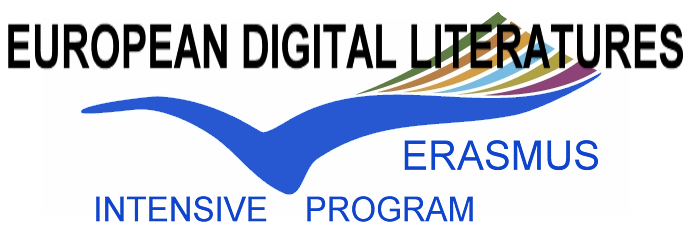2012 Erasmus IP
This Erasmus Intensive Program dedicated to digital literature is unique in Europe. You might think that it was limited to a specialized avant-garde field and would only interest a fewenthusiasts. Far from it! Digital Literature, for sixty years now, has used and misused the computer, explored its possibilities, and questionned its everyday use. It has developed innovative approaches, and anticipated uses of the computer that are common today, highlighting both the limits and the rich potential of the digital. Creative, of course it continues to propose newpossibilities, as a way of subverting the normative practices that the industry is trying to impose. Digital literature exploits the traditional computer as well as mobiles, tablets, social networks, geolocalisation and all the environments that the digital creates. It is is forward-facing. That's why engaging with this inititiative at the intersection of technology and creativity will be of interest tomany disciplines. It will be an asset of particular benefit to tomorrow’s creative professionals, whether they are working in the humanities, in artistic or literary fields, or in computer science. This is why we wanted to make this course available to as many disciplines as possible, in an attempt to gather a group of students with complementary skills. This 2012 erasmus intensive program was opened to Masters and Doctoral students in, among others, literature, foreign languages, communication, computer sciences, hypermedia, media studies, cultural studies, fine arts, performance arts, creative writing, Literaturwissenschaft und Medienkultur, coming from the partners Universities: the Université Paris 8, the Universidad Complutense, the University of Siegen, the Universidade Fernando Pessoa, the Universitat de Barcelona and University College Falmouth.
Different nationalities, different backgrounds and training, multiple levels, the conditions are right for this contact to be rewarding for everyone in a truly European context. For Europe is formedby all of us, in our diversity, walking together toward a common goal. It is this diversity that the erasmus intensive programs are designed to support over a short period. This was a particularly valuable experience for all participants, students and teachers.
The program held in Madrid, at the Complutense University, from June 25th to July 13th, 2012. Students were accommodated in rooms. Air flights (from your university to Madrid) , accommodation and lunch were covered by the program. No additional fee is required so that participation in this program does not involve special costs.
The program is open to thirty selected students with a ratio for each university. Students coming from Arts, Computing Sciences, Media Studies and Literatures at Master level are welcome. Lessons are conducted in English by teachers of different nationalities. Not everyone is fluent in the language of Shakespeare's but the group is here to help each student to assimilate the concepts. Courses will not consist of lectures, but of sessions based on presentations of works and exchanges. A digital platform and course materials will be provided.
The program is split into two periods. The first period focuses on the discovery of this literature, with its roots in the aesthetics of combination, visual and sound poetry and literary theories of the twentieth century. Then, the principal aspects of digital literature is presented: hypertext, animation, performance, the role of the program, the technical apparatus, the changing modalities of reading and writing, the creation of new rhetorical forms, the relationship between digital literature and other artforms. These presentations alternate between thematic sessionsaddressing these topics and presentations of works, country by country, in order to show the different cultural approaches to this literature.
During the second period, students working in groups of 2 or 3 in workshops conceive of and produce creative works using digital tools and programs. This practical work is an opportunity to take advantage of complementary skills. These workshops are supervised by several teachers, and a wide variety of tools are made available, some requiring no computing skills. These are the programs and tools we are going to use: for animations, Flash, Processing, Dreamweaver, Director, Pure Data; for design, Inkskape, Gimp. Videopad; as video editors Mediacoder, Mediainfo, Cool Edit Pro 2.1.
The assessment was carried out in two stages during the program: in the first part, through critical reflection and analysis and in the second, through an oral presentation of creative work. This program carries ECTS credits delivered in each University..
Social evenings and cultural visits completed the course in order to make these three weeks a time of new friendships and connections.
 |
 |
 |
 |
 |
 |





